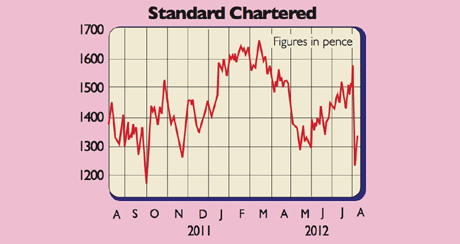Get the latest financial news, insights and expert analysis from our award-winning MoneyWeek team, to help you understand what really matters when it comes to your finances.
You are now subscribed
Your newsletter sign-up was successful
Want to add more newsletters?

Twice daily
MoneyWeek
Get the latest financial news, insights and expert analysis from our award-winning MoneyWeek team, to help you understand what really matters when it comes to your finances.

Four times a week
Look After My Bills
Sign up to our free money-saving newsletter, filled with the latest news and expert advice to help you find the best tips and deals for managing your bills. Start saving today!
Shares in Standard Chartered dropped 16% on Tuesday following allegations that the emerging-market-focused bank laundered money for Iranian clients. The New York's State Department of Financial Services, led by Benjamin Lawsky, claims the bank hid as much as $250bn of transactions with Iran, which is under US sanctions. The regulator called Standard Chartered a "rogue institution" and threatened to revoke its New York operating licence.
The company strongly denies the allegations, claiming it voluntarily approached US regulators after conducting an internal review and that improperly disclosed transactions total less than $14m. The shares bounced back 8% on Wednesday.
What the commentators said:
At last week's results Standard Chartered's chairman Sir John Peace was "bigging up" the bank's culture and values as a "competitive advantage", said Lex in the FT. However, these allegations have wiped that out. Even if they are false, any "cleanliness premium'" will disappear. Standard will at the very least face a fine Credit Suisse, Lloyds, ING and Barclays paid a combined $1.8bn for "similar misdemeanours".
MoneyWeek
Subscribe to MoneyWeek today and get your first six magazine issues absolutely FREE

Sign up to Money Morning
Don't miss the latest investment and personal finances news, market analysis, plus money-saving tips with our free twice-daily newsletter
Don't miss the latest investment and personal finances news, market analysis, plus money-saving tips with our free twice-daily newsletter
A bigger threat is the US regulator revoking its licence. The company's "body language does not suggest a quick solution". Instead of apologising, it has "come out fighting". This could be a "long, dirty" battle.

If the allegations are true, "that's the end" of Standard Chartered, said Damian Reece in The Daily Telegraph. If they are wrong, then "that's the end of Lawsky". Responsible regulators operate within the regulatory system. Rogue regulators are no better than rogue banks. The fact that Lawsky's DFS broke ranks with other regulators is "odd" and makes one wonder "what calculation Lawsky has made". If Lawsky is wrong, "he must be held to account".
This scandal is a "bitter blow" for the City's reputation," said Allister Heath in City AM. It is also "a tragedy" for Standard Chartered, which didn't require a bail-out and was the "last major UK bank able to hold its head high". The DFS's 27-page "attack" is written in "typically inflammatory language".
While it is wrong for any UK bank to break the law, there is now a risk of the US "imposing its foreign policy on every single foreign company" it has dealings with. The US now "has it in for the City".
Get the latest financial news, insights and expert analysis from our award-winning MoneyWeek team, to help you understand what really matters when it comes to your finances.
MoneyWeek is written by a team of experienced and award-winning journalists, plus expert columnists. As well as daily digital news and features, MoneyWeek also publishes a weekly magazine, covering investing and personal finance. From share tips, pensions, gold to practical investment tips - we provide a round-up to help you make money and keep it.
-
 Should you buy an active ETF?
Should you buy an active ETF?ETFs are often mischaracterised as passive products, but they can be a convenient way to add active management to your portfolio
-
 Power up your pension before 5 April – easy ways to save before the tax year end
Power up your pension before 5 April – easy ways to save before the tax year endWith the end of the tax year looming, pension savers currently have a window to review and maximise what’s going into their retirement funds – we look at how

